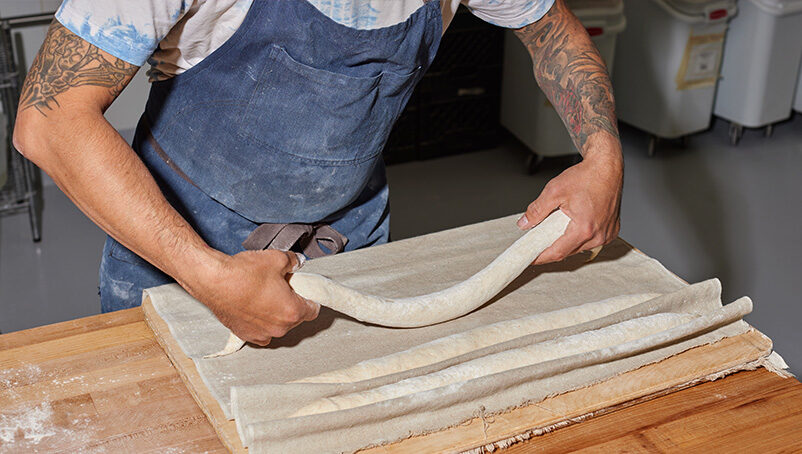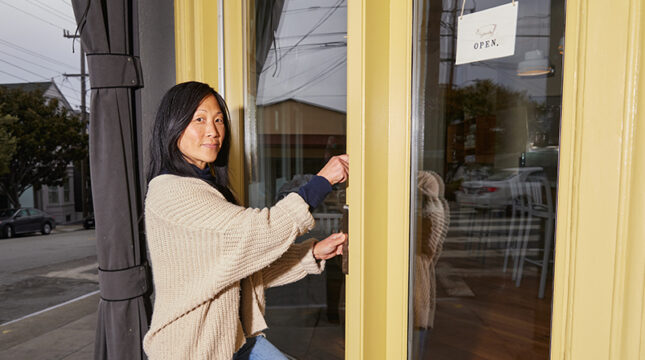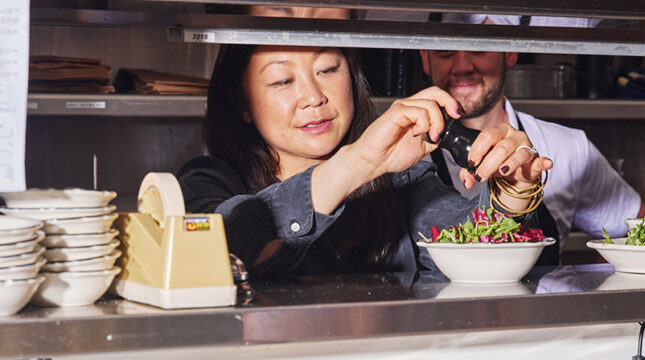Which insurance for restaurants should you consider?
Many factors determine the restaurant business insurance you need. Perhaps you have outdoor seating or offer delivery. Here’s what to consider to properly assess your risks.
- Restaurant operations. Consider the type of restaurant you own. Is it a ghost kitchen, or will you be hosting guests in the dining room?
- Physical location. Look at where your restaurant is located. Are you in a building you own or renting a space?
- Employees. Determine the number and type of employees you’ll have on staff.
- Added services. Do you have amenities or extras at your restaurant? For example, figure out if you’ll need a company-owned vehicle for deliveries or to transport equipment.
- Finalize your food and drink licenses. While your staff will likely have to secure food handler licensing, this is also where you decide if you’re serving alcohol.
General liability insurance
Restaurants are busy places with a lot of people moving in and out during the lunch or dinner rush. That’s why many restaurant owners opt for general liability insurance, which can help cover medical expenses and the cost of property damage in the event of an accident involving someone other than your employees.
Restaurant liability insurance could cover a customer’s medical bills if they slipped on a wet floor and you were held responsible. Or it could cover the costs associated with a lawsuit if you accidentally use a copyrighted image in a social media post.
General liability might also cover replacing a customer’s property, like a cell phone, if a server accidentally spills a drink on it. General liability insurance can help if a server mistakenly brought food to a customer with an allergy who became ill.
Check with your restaurant’s property owner, as well as local and state laws, to learn if you’re required to carry general liability insurance before you open.
Commercial property insurance
Commercial property insurance aids restaurant owners who rent or own a physical space by protecting the building and what’s inside the building.
In the case of a covered event — such as a burst pipe that floods your kitchen — restaurant insurance could help with repairs or replacement for equipment, inventory and spoiled food. If you’re the property owner, you may also get help with repairs to the building in a covered instance of fire or vandalism.
Business owner’s policy (BOP insurance)
A business owner’s policy, also called a BOP insurance policy, combines all of the coverage of both general liability and commercial property insurance into a single, more efficient and comprehensive package.
The beauty of a BOP is that it can carry more protection than just a single policy. It can help cover damage that you or your employees may inadvertently cause to another person’s property, as well as bodily injury accidents that injure patrons or passersby to your business.
BOP keeps going to help protect your business inventory in the event of a fire or water damage or other covered event.
And its arms can reach to cover business income interruptions, advertising injury if you’re accused of infringing someone’s copyright in your advertising, libel, slander; and court and attorneys’ fees if you need an attorney to defend against a lawsuit. In short, a BOP can do a lot.
Commercial auto insurance
Commercial auto insurance is a critical piece of restaurant insurance if you or your employees use a vehicle to run errands or deliveries for your restaurant.
If you use a personal vehicle to shuttle ingredients from restaurant supply or to take an ice cream machine in for repair, personal auto insurance won’t always cover business-related driving if you get into an accident.
Commercial auto insurance could also help you cover medical expenses and property damage in the event of an accident involving a business-owned vehicle. You may also be reimbursed for the cost of a rental while your work vehicle is in the shop.
Workers’ compensation insurance
Since you may be hiring employees that are new to the service industry, it’s important that you’re covered in case of injury. The U.S. Bureau of Labor Statistics reported 93,800 injuries and illnesses among restaurant workers in a single year. And more than a third of those cases required people to take at least one day off from work.
While commercial cleaning protocols and safety training can mitigate risk, accidents do happen. Let’s say a new trainee burns their arm on the side of an oven or cuts their hand on a broken glass. Workers’ comp insurance could help cover lost wages and medical expenses for your employee — and help protect you from liability.
Note: Workers’ compensation is typically required by law in most states if you have people working for you.
Liquor liability insurance
Serving alcohol can boost your profit margins, but it accompanies some potential liability. That’s why your restaurant could benefit from liquor liability insurance.
This type of restaurant liability insurance can help protect your business if an intoxicated customer engages in destructive behavior — even if it’s after they’ve left your restaurant. Liquor liability insurance could help with legal defense fees or medical bills if your restaurant is accused.






